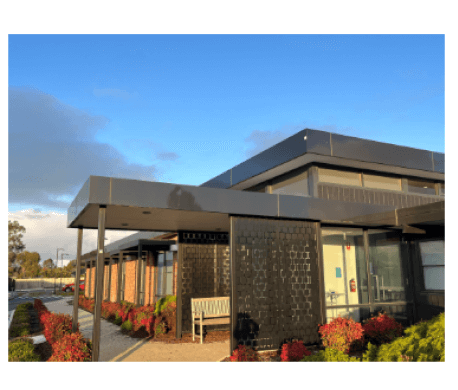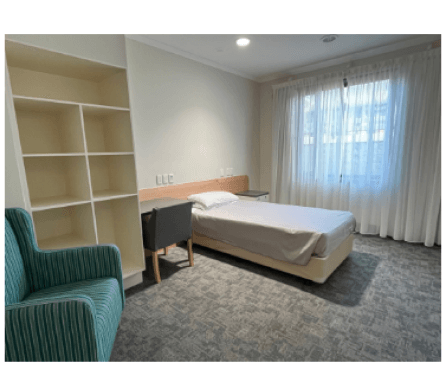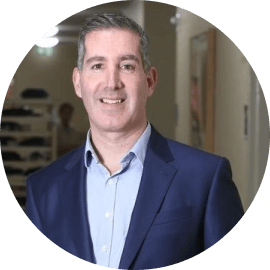
Geelong Eating Disorder Treatment

Expert and caring treatment on your path to recovery
If you or a loved one is living with an eating disorder, getting treatment is a vital step towards recovery. At The Geelong Clinic, our caring and highly skilled professionals offer evidence-based treatment for eating disorders, delivered with sensitivity and compassion.
What is an eating disorder?
Unlike some stereotypes, eating disorders are not a cry for attention or a lifestyle decision. An eating disorder is a serious mental health condition that involves unhealthy thoughts, beliefs and behaviours around food and eating.
As well as being preoccupied with food, people living with an eating disorder can be obsessed with exercise and their body weight or shape.
Eating disorders adversely affect a person’s physical, emotional, and social wellbeing. Eating disorders affect between 4% and 16% of Australians. They can often exist alongside other disorders like depression and anxiety.
Anyone can develop an eating disorder, regardless of their sex, age, cultural background, or body size.
Acknowledging that you need help can be hard, but it’s the first step in getting the treatment that will help you recover.
Types of eating disorders
There are several types of eating disorder (ED), including:

Anorexia nervosa
People with anorexia nervosa are preoccupied with food and afraid of gaining weight. They tend to have a distorted body image, seeing themselves as overweight even when they are not. Many people with anorexia nervosa are severely underweight. Brain changes related to malnutrition and starvation can make it difficult for someone with anorexia nervosa to acknowledge they are not well.

Bulimia nervosa
People with bulimia engage in binge eating (consuming an abnormally large amount of food in a short time). This is followed by efforts to rid themselves of the food (known as ‘purging’) through self-induced vomiting, excessive exercise, or using laxatives, enemas or diuretic pills. Bulimia nervosa often starts during or after weight-loss dieting..

Binge eating disorder
People with binge eating disorder eat abnormally large amounts of food, even when they are not hungry. However, they do not engage in purging behaviours afterwards. People with this condition often binge eat in secret or when they are alone. They often experience feelings of guilt, shame, and disgust after a binge.

Avoidant/restrictive food intake disorder (ARFID)
This involves a persistent and disturbed pattern of eating or feeding that causes malnutrition. People with ARFID avoid or restrict certain foods for reasons other than wanting to lose weight, such as dislike of certain textures or smells or fear of choking. ARFID can lead to serious medical issues.

Other specified feeding or eating disorder (OSFED)
People with OSFED have signs associated with other eating disorders, such as disrupted eating behaviours and a distorted body image. However, these symptoms do not meet the criteria for diagnosis with another eating disorder.

Orthorexia
While not officially recognised as an eating disorder, people with orthorexia are fixated on healthy or ‘clean’ eating.

Treatment for eating disorders
If you’re living with an eating disorder, treatment can help you re-establish a healthier relationship with food and eating, and restore your physical and mental wellbeing.
At The Geelong Clinic, our dedicated and experienced professionals offer high-quality eating disorder treatments and programs for people aged 16 and over.
Dietitians specialising in Eating Disorder treatment are part of the multidisciplinary team to support patients, ensuring that their nutritional and sensory needs are being met. The dietitians create and monitor meal plans for patients, do individual reviews and facilitate psychoeducational and exposure therapy groups. In the PREP program, dietitians support patients to plan, shop for, and cook their own food every week.
Inpatient eating disorder programs
Our Eating Disorders Inpatient Programs have been specifically designed to progress people from the acute stage of illness to a level where they can monitor and manage themselves.
Learn to Eat at Peace (LEAP)
LEAP aims to support patients to begin the process of recovery from an eating disorder and learn new skills to replace eating disorder behaviours. Often patients admitted to LEAP will need support with weight restoration.
What LEAP offers:
- A 40-day inpatient program
- Individualised evidence-based treatment that is adapted to the patient’s unique experience and eating disorder concerns.
- Weekly group therapy including, psychology-based groups, nutrition, art therapy, yoga and gentle movement, music therapy, mindfulness and relaxation.
- Individual therapy with a psychiatrist and psychologist.
All meals and snacks are prepared by the hospital and patients are supported during their meals. There is a focus on discharge planning to assist patients with the transition to home and to continue working towards their recovery goals.

Proactive Recovery Enhancement Program (PREP)
PREP aims to support those who have already begun their journey of recovery and to help consolidate skills in replacing eating disorder behaviours with a greater sense of autonomy. It also focuses on supporting patients learn new life skills to help move toward living a more fulfilled life.
PREP is for those who are ready to take on more responsibility as they move towards recovery. This includes assistance in challenging themselves with tasks designed to expand their ability to budget, shop, prepare, cook and eat food. Treatment is tailored to the individual and their particular vulnerabilities and strengths, with an emphasis on the whole person and their unique history.
PREP includes:
- A 40-day inpatient program
- Weekly groups include exposure therapy (e.g. grocery shopping), psychotherapy, gentle movement and exercise, art and music therapies.
- Individual therapy sessions with a psychiatrist and psychologist.
In PREP, some meals and snacks are prepared by the hospital while others are prepared by the patient as part of their therapy.


Ongoing support for eating disorders
As part of discharge planning from one of our inpatient programs, your treating team will consider whether an outpatient day program is appropriate for you. A referral from a psychiatrist is required.
Our day programs commence regularly throughout the year. Please contact us for more information on next start dates and availability.

Eating Disorders Program Information Pack
This pack will provide you with more information on:
- Our LEAP and PREP Inpatient Programs
- Sample timetables
- Your treating team
- The admission process and what to bring
You can download the PDF here
The Geelong Clinic psychiatrists
Accommodation at our Geelong facility
For the inpatient programs, you’ll stay with us and receive 24-hour support in a refurbished facility with a comfortable, home-like feel. The Geelong Clinic facilities include:
- Private rooms with air conditioning, ensuite, TV, telephone and a nurse call button
- Shared courtyard for you to use and an outdoor visitor area
- Interpreters and chaplaincy services are available on request
- Laundry facilities
- Visitor and disabled parking.


Getting a referral
To access Eating Disorders programs at The Geelong Clinic, you’ll need a referral from your GP or psychiatrist.
A physical assessment is also required by your doctor to determine current physical health prior to an admission. This includes pathology tests and an ECG.
Please call us on 03 5240 0700 or email tgcintake@healthscope.com.au for further information on the admission process.
For GPs
GPs can address their referral generally to ‘Dear Doctor’ or directly by name to one of our accredited psychiatrists.
As part of the admission process, a physical assessment for eating disorders form should be completed by the referring doctor and can be found here:
![]()
GPs can submit referrals and the physical assessment form to our Intake Team via fax on 03 5240 0799 or email tgcintake@healthscope.com.au
Costs
We understand that costs for admission to a private mental health facility and related charges can
be complex, so please call us with any questions you have – we’re more than happy to help.
![]()
Private health insurance
Depending on your level of cover we can estimate hospital charges, outline how much cover your fund offers, and inform you about any out-of-pocket costs you may need to pay. We’ll need to do a private health fund check before you can be admitted or start the program. We’re recognised by all major private health funds that reimburse treatment costs.
![]()
No private health insurance
If you don’t have private health insurance, you can call us on 03 5240 0700 to discuss self-funding your stay with our Front Office Manager. Please call before admission for an estimate of the cost of your stay. You’ll need to pay for your stay in full upon admission.
FAQs
Yes. We’re a private, regulated mental health facility, accredited under The Australian Council on Healthcare Standards (ACHS).
Yes. You’ll be under the care of the same accredited psychiatrist during the program.
Yes, we generally have available beds and our psychiatrists have capacity to accept new admissions. If the patient is accepted for admission they are usually admitted within a week.
No. We are only a voluntary hospital and patients need to be at a certain risk level appropriate for The Geelong Clinic. If a patient’s condition deteriorates during their admission with us and are sectioned under the Mental Health Act (involuntary), we will transfer them to the nearest public psychiatric unit, at Barwon Health Swanston Centre.
Yes. We welcome people with a mental health condition and an addiction. The patient’s diagnoses’ will be reviewed and treated by the admitting psychiatrist during their stay and referred accordingly after admission.
If you don’t have private health insurance call our Front Office Manager to discuss this as one option is to self-fund your stay. Please call before admission for an estimate for the cost of your stay. You’ll need to pay for your stay in full upon admission.
Yes you can bring your phone, device or laptop but you are soley responsible for it. If you have an addiction relating to your phone/device there may be times when you can’t access it but you’ll be guided by your treating psychiatrist.
Yes. We’ll check your bags in the presence of two nursing staff. But before you arrive, we’ll provide a detailed list of what is, and what isn’t allowed.
Yes, you can access to a designated smoking area for cigarettes but Vape devices are not allowed.
Yes you can leave but will first need approval from your treating psychiatrist.
Yes you can have visitors and we ask that they follow any restrictions that may be in place due to COVID-19.
Yes. We’ll complete hourly visual checks throughout the day and night.
Yes we encourage you to bring your own pens/highlighters.
Yes. You can use the onsite washing machines, detergent and dryers.


